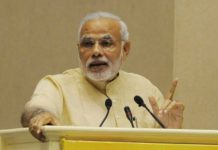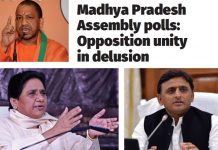
As winter sets in, a number of incidents of attacks along religious lines are sending a chill down the nation’s spine. The rising intolerance is not going unchallenged. Prominent among the voices raised are those of President Pranab Mukherjee, writers and creative artistes who for good measure have returned their official awards. The ruling regime and its ideological allies, confronted the critics. Union Finance Minister Arun Jaitley said that the award-return drama was only a “manufactured paper rebellion” and those who did it included “rabid anti-BJP elements”.
Then came a voice from an unusual quarter: Reserve Bank of India Governor Raghuram Rajan. The governor, in fact, set the peace-loving pigeon among the cats when he claimed that intolerance, be it of any kind, can impede the country’s economic growth. It can scare away foreign investors. In a public speech, he claimed, “India’s tradition of debate and an open spirit of enquiry is critical for its economic progress.” He added diplomatically, “Should ideas or behaviour that hurt a particular intellectual position or group be banned? Possibly, but a quick resort to bans will chill all debate as everyone will be anguished by ideas they dislike.” He was obviously referring to a string of bans by the BJP-ruled states on beef and internet services (though temporary).
Comments like these from a respected central banker raise an obvious question. Is there really a link between religious intolerance and economic growth? If yes, how does the former impact the latter? Does empirical evidence show the global business community shying away from nations that restrict or curb religious and other forms of freedoms? Most important, can Prime Minister Narendra Modi fulfill his grand promises of high growth and ‘development for all’ if he doesn’t rein in the extremist elements?
Intolerance versus growth
Economist Paul Donovan’s recent research argued that “the issue of prejudice in society is not an abstract concept that investors can afford to ignore.” He added that any form of discrimination, be it based on religion, nationality, race, gender or sexual orientation in any country is firmly linked to its economic development. He used the World Economic Forum’s data to conclude that there was a “clear relationship” between the two. While nations that witnessed low growth rates had high prejudices in their societies, the opposite was true for the developed countries.
His reasons for the above analysis were purely economic. “The basic reason prejudice damages an economy is that it encourages the uneconomic wastage of a critical resource (labour). If someone fails to reach their full potential as a worker in society because prejudice denies them equal opportunity, or restricts their career options, then the individual’s full productive potential is denied to society at large,” he claimed. He added that “prejudice has been described as (an) anti-social capital and as behaving as the antithesis of growth enhancing social capital.”
However, he made a distinction between the various kinds of discrimination. According to him, racism and homophobia were most prevalent in under- developed economies. In the case of immigrants, the feelings against them were more of a concern in mid-level economies. In fact, the least developed nations were quite tolerant of the people from other nationalities. Ironically, there was a “loose relationship” between religious tolerance and economic growth.
The fact is that there are several examples of nations that exhibit religious discrimination, but have achieved high, consistent growth over long periods. A notable example is that of China, whose rulers have displayed disdain for religious communities like Buddhists and Muslims in certain regions.
A recent article in Foreign Policy said that in China, Muslim women “either enjoy unprecedented space for religious expression or face more restrictions on their faith than they would almost anywhere else in the world — all depending on who and where they are.”
One can also cite examples of countries that are multi-ethnic, but consider themselves as religious states and which grew at a frenetic pace for decades. Malaysia is one such nation, although its growth has slowed down in the recent past. Donald R Snodgrass’ analysis showed that Malaysia was the world’s tenth fastest growing economy between 1970 and 1990. This was the period when “ethnically heterogeneous countries were underrepresented among the fastest-growing economies and over-represented among the countries that were unable to raise per capital income…”
The question that arises is: are these notable exceptions that prove the rule that religious intolerance can impede growth or do they represent the so-called “loose relationship” between the two? Donovan’s advice to the investors possibly provides the best answer. “For investors, we believe prejudice in an economy should be considered a sell signal. In our view, evidence of prejudice is evidence of a disregard for the maximisation of economic potential and financial returns,” he said.













